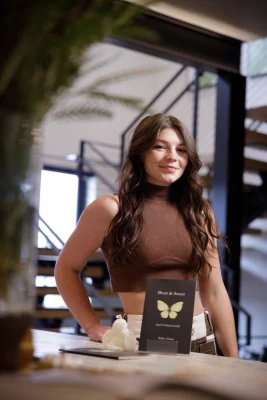
“Crooked Solace”: Bailee Elaine’s Short & Sweet (and f*cking brutal)
Art
The internet age seeks to give space to everything: to grief and to love, to family and to tragedy. But in the fast-paced nature of the present, the desire to acknowledge complicated things is often overpowered by the anticipation of what’s next. Once something difficult, whether global or personal, is pushed from a spotlight, we are expected to have come to terms with it, to “move on” and not return.
As anyone who has experienced loss knows, “moving on” is not that easy. In her collection Short & Sweet (and f*cking brutal), Utah poet Bailee Elaine explores the cyclical nature of her own journey with grief following the death of her brother Brady in 2004.

Elaine was six when her 10-year-old brother passed away in an ATV accident. She recounts the few words her father shared with her and her siblings: “‘Brady’s not coming home this time.’” In Part 1 of the collection, Elaine writes the time following the incident, exploring the shared grief of herself and her family alongside the world’s twin sympathy and detachment. She shares memories of her brother’s funeral: “Letters tied to green balloons. / Hoping they might reach you.” and the brutal slickness of time amidst her continued pain: “And after that, life went on.”
“I even have a journal from when I was really young, maybe seven or eight, in which I’m writing a letter to my brother, and I say, ‘I will write a book about you one day.’” said Elaine.
In Short & Sweet’s Part 2, Elaine explores the legacy of her loss, charting her emotions as the memory of her brother becomes more distant. Her emotions range from deep aching (“Please visit me soon. / Either in a dream or as a bird.”) to uncomfortable remembrance (“That’s where my brother died. / Do I say it?”). Elaine’s emotions do not maintain a straightforward path as her brother’s presence weaves in and out of her life, its reflection shifting by memory and social interaction. As Elaine reckons with the idea of moving on, the world around her changes but her brother’s memory never fully leaves her.
“[Since] I lost my brother in 2004, [I’ve had] this calling to write that story,” recounts Elaine. “I even have a journal from when I was really young, maybe seven or eight, in which I’m writing a letter to my brother, and I say, ‘I will write a book about you one day.’” For Elaine, writing a book about her brother’s passing was as much about her own continued grieving process as it was about his memory. While Elaine explores the effect of his absence on her life in Part 1, she shows the complex ways in which her brother continually returns to her in Part 2.
“Letters tied to green balloons. / Hoping they might reach you,” writes Elaine.
“Healing is not linear. Grief is not linear,” she says. As Elaine pored through her memories and journals to write the book, she “felt [a] push from [her brother].” That push allowed her to return to her inner child and again sift through the complex emotions of the past 20 years, finding a “crooked solace” in her grief, her growth and her brother’s celestial presence. Elaine comes to a point where she no longer finds herself defined by her brother’s death, realizing his protective presence in her life and her own identity’s summation as greater than any one event. Amid her tidal emotions of loss, Elaine is liberated by choosing to let the waves take their place in a larger ocean.
“I don’t need knives. I’ve got angels.” In her reflections on life after her brother’s passing, Elaine affirms that those we lose always remain with us, even as our emotions ebb and flow. Elaine’s poetry shows how we can find comfort in those we have lost and proves that continuing to love them is a strength, not a weakness. Unsigned copies of the book can be found on Amazon and signed ones on baileeelaine.com. For more of Elaine’s writing, follow @baileeelainewrites on Instagram.
Read more interviews with Utah authors:
American Metal–Ain’t Nothing but a Good Time!
“Something Bizarre and Super Fucked Up”: Literature as Play With Author Michael Farfel